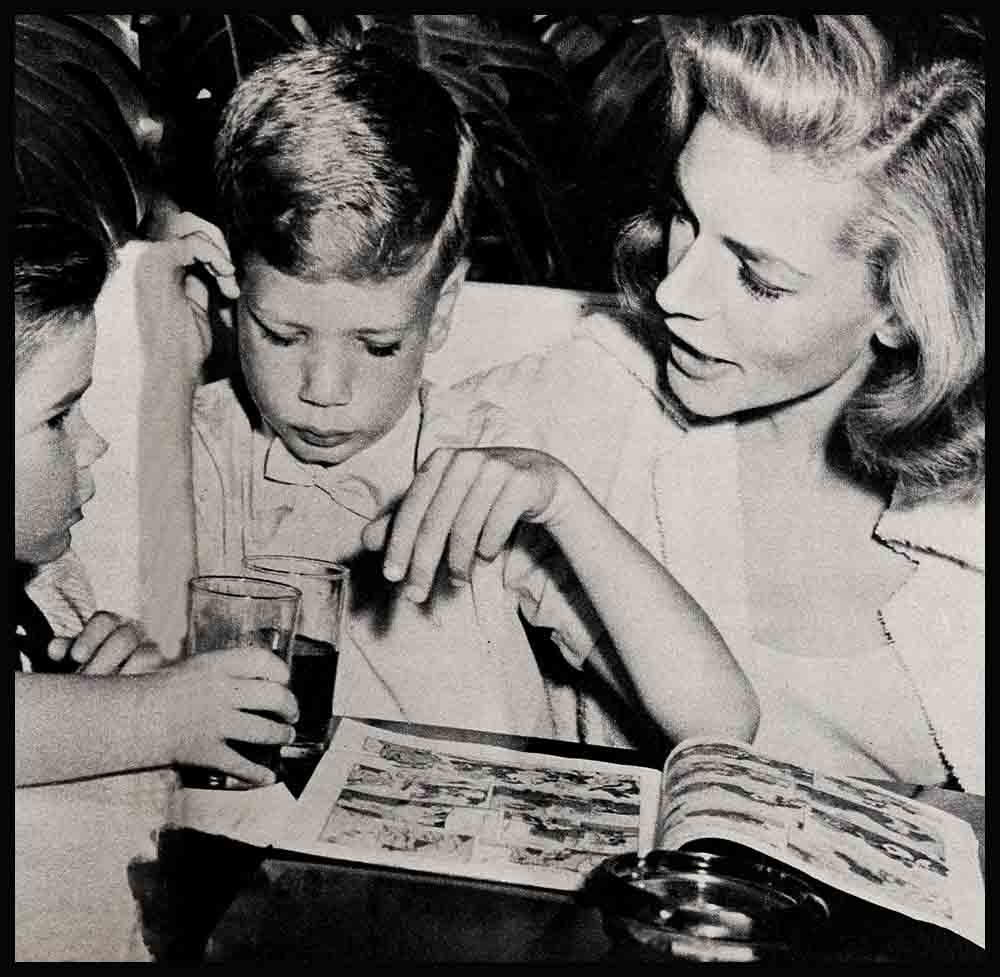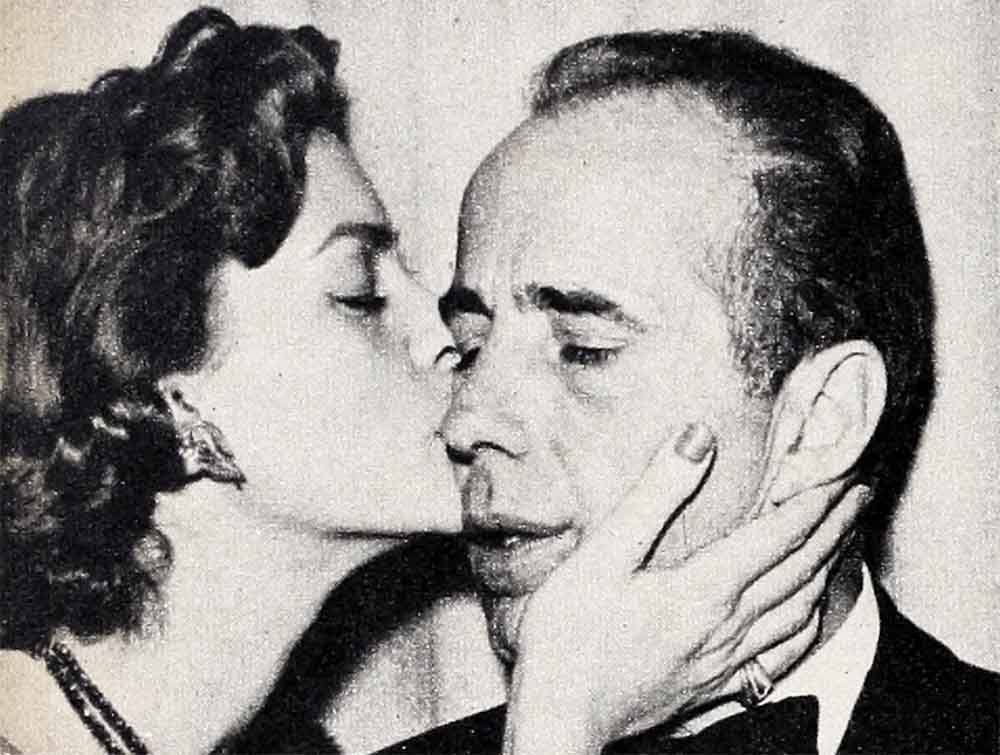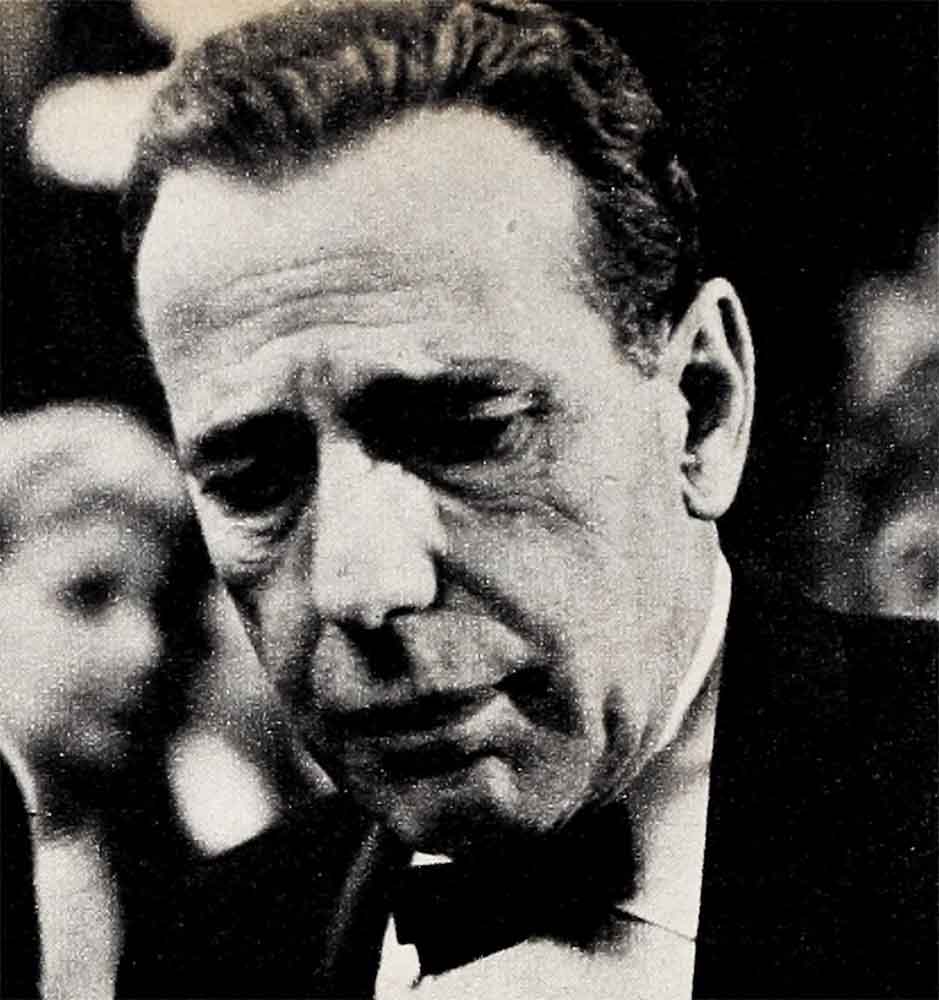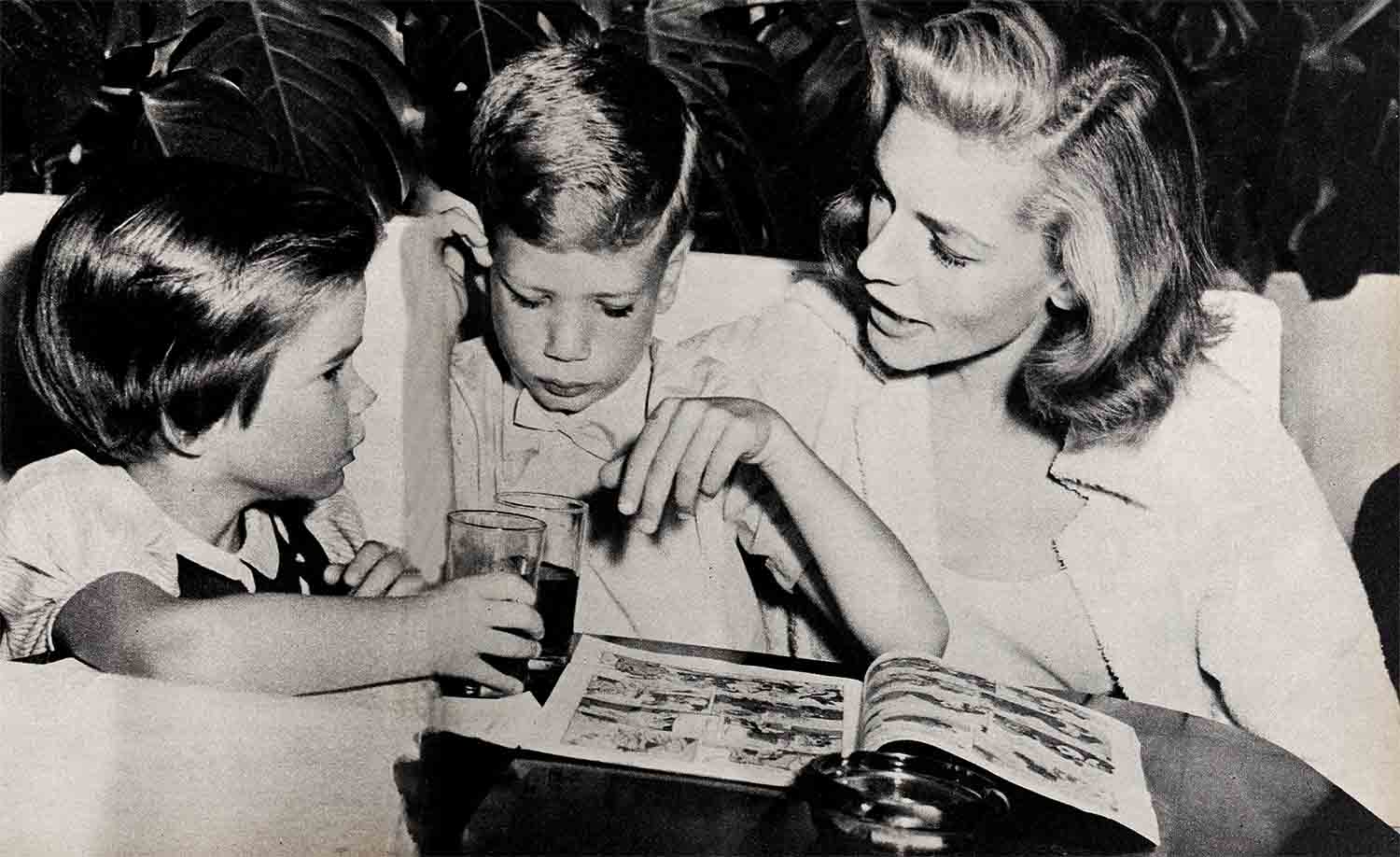
Know Not The Face Of Fear
Editor’s Note: For two years, Lauren Bacall Bogart lived with the knowledge that her beloved husband was ill with cancer, and that the chances were slim of his emerging victorious from his battle with the disease. Inherent in this girl’s valiant nature is the exhibition of courage which has allowed her to build into her marriage the happy memories which now must always remain memories only. This is Lauren’s story—the story of her courage, her warmth, her ability to build a future for the children u:ho were so adored by Bogie. It is also a reverent tribute to a wonderful man.
Eleven years ago, not long after her marriage to Humphrey Bogart, Lauren Bacall said, “I have always wanted a husband, children, and a home of my own more than I wanted a career. I made up my mind long ago that they would always come first. In future years there will probably be important choices, in terms of family versus professional life, and I hope that I have the wisdom to stand by what I have always believed. It is so easy to lose one’s sense of balance.”
Lauren never lost her sense of balance, as many another Hollywood wife has to her sorrow. Lauren had the wisdom to live with balance—the wisdom and the courage. True. she gave generously of her talents to a career; the film industry has been enriched by these talents. But Lauren gave more of herself, as a person, to her home and family; four lives have been altered by her love and her devotion. The career suffered, as it had to, by the cancellation of several important pictures so that she could take care of her husband during his illness. But this was unimportant.
AUDIO BOOK
That Bogie would not recover was a fact Lauren was prepared for, although the fact was no easier to accept. Death is always a tragedy. It has momentarily obscured Lauren’s interest in her profession—an interest which began for her when she was still in high school, and which everybody hopes will continue when the wounds have begun to heal and she is ready to pick up the loose threads of her life.
Back in 1942, Lauren was unknown— just sixteen and a hostess at the Stage Door Canteen. Her nightly trips to the Canteen were a contribution to the war effort, no doubt of that. But she didn’t let the fact escape her that while she was giving a serviceman a whirl around the floor, she could also “accidentally” bump into some of the hosts on duty. They happened to be important stage producers, like Vinton Freedley, Gilbert Miller and Kermit Bloomgarden. Of course, they should have taken one look at her and said, “Where have you been all our lives?” Only, as Lauren discovered, they didn’t. They were too busy talking to actresses like Lynn Fontanne, Helen Hayes and Shirley Booth.
But if you think that discouraged Lauren, you have forgotten the confidence of youth. At sixteen, in her determination to be an actress, no doubts assailed her. This in spite of the fact that she had no personal contacts to give her any letters of introduction. She didn’t even have an agent. Nor had she an independent income to tide her over, while trudging from one theatrical office to another during the next few years. But Lauren had other advantages. She was blessed with beautiful tawny hair, sultry green eyes, a wide, generous mouth, a streamlined figure, a flair for wearing clothes. And, just as important, she had relentless ambition.
Lauren’s mother recognized her only child’s potentials fairly early in the game. One evening, when Lauren was about ten and living in Brooklyn, her four uncles (all of whom were the father she never knew) took mother and daughter to dine in a New York restaurant. Lauren asked everyone to write something on the menu for her to save as a souvenir. Her mother wrote prophetically, “To a future Hollywood star.”

So it began. And so it continued when Lauren, after graduating from Julia Richman High School, where she was a prize pupil, enrolled at the American Academy of Dramatic Arts. Among her classmates was Eddie Cantor’s daughter, Marilyn. While Marilyn was being supported by her father in the style to which she was accustomed, Lauren had to earn her keep as an usherette at the St. James Theatre.
After classes, Marilyn would often invite Lauren to dinner at the elegant Essex House where she lived with her family. Lauren didn’t know which she enjoyed more—the Cantor jokes or the Cantor larder. One night after she left, Eddie exclaimed to Marilyn, “Don’t look now, but I think that girl has a tapeworm. She doesn’t want to be an actress too, does she?”
Sharing classes with Lauren and Marilyn was another young hopeful, who doubled in brass as a soda jerk at Schrafft’s. His name was Kirk Douglas. He and Lauren took a great shine to each other, and when she found herself low in funds, Lauren had dinner at the Schrafft’s counter. Kirk would serve her extra helpings and refuse to take a tip. Then, when Lauren’s friends or relatives invited her out, she’d always steer them to Schrafît’s and see that they left an extra-large something for Kirk.
Two years later when Lauren went to Hollywood, it was she who suggested to Hal Wallis that he not overlook the young soda jerk when searching for new talent in New York. Today Lauren and Kirk are close neighbors in Holmby Hills. But they move in different circles and their paths cross only at big parties.
In her high school days Lauren’s big female crush was Bette Davis. By a happy coincidence, Bette’s great friend Robin Byron Brown was also a friend of Lauren’s Uncle Jacques. Aware of his niece’s admiration for the First Lady of Hollywood, Uncle Jacques arranged for the two girls to meet. Bette received her young admirer cordially, along with an equally stagestruck classmate. Although awed at being in The Presence, Lauren held up her end of the conversation with her customary poise. But the talk did not last very long. The classmate was so overcome by meeting Bette in person that she fainted dead away. Lauren and her hostess spent the rest of the visit reviving her.
Coincidentally, when Lauren made her first picture at Warners, on the next sound stage was Bette Davis. And when Lauren came back to New York after her overnight success in “To Have or Have Not,” she asked the studio to reserve for her the same suite at the Hotel Gotham which Bette Davis had occupied on her last visit. It was in this suite that Warners’ newest star, Lauren Bacall, received her fans and the press.
When Lauren first met Paul Lukas, she was still an unknown, modeling for a living and selling copies of Show Business for extra cash. But all of her spare hours were spent studying and seeing Broadway plays. At the time Lukas was starring in “Watch on the Rhine,” and one Saturday afternoon Lauren knocked at his dressing-room door. “You are the greatest actor I have ever seen,” she announced. “I would like to discuss the theatre with you.” Paul was so overcome by the direct approach of this serious fan that he proceeded to discuss the theatre—not only then, but at many matinees afterward.
This picture of what amounts to a great deal of pluck and determination on the part of a struggling young actress is often pooh-poohed by Lauren. She tends to interpret her life as the result of pure good fortune. “I got an awfully good start, you know. I had security—not financial, but the security of being loved by a wonderful mother and a great family.”

Lauren also had the good luck to have found that same security in her marriage to Humphrey Bogart. They met when she made her screen debut as his leading lady. She took one look at him and said, “Ooh, Daddy, buy me that!” As the picture progressed, Bogie took more than one look, but didn’t say much. He did some serious thinking, though. Soon well-meaning friends began to volunteer advice. Bogie just couldn’t marry a girl nearly thirty years younger than he!
Friends talked to Lauren. They reminded her of Bogie’s three previous marriages—to Helen Menken, Mary Phillips and Mayo Methot. All of these mergers had ended unhappily.
“Well,” Lauren answered, “at least he married the women he loved!”
She was well aware that three marital flops should be counted against a man, but she also knew that Bogie was neither promiscuous nor a playboy. She knew that essentially he was a home-loving guy. And if she, Lauren, could make a home for him that he would never want to leave, and give him the family he never had, she might succeed where others had failed.
So, secure in their love for each other, Lauren and Bogie ignored all the danger signals, and on May 16, 1945, they were married. Everyone forecast that it wouldn’t last a year.
Although Lauren was Bogie’s junior by so many years, amazingly enough it was Lauren’s influence which had dominated their marriage and kept it unfalteringly happy. Bogie, although one of the highest-priced stars in Hollywood, never had delusions of grandeur. He always lived simply, in a small house with a small staff to run it for him. Left to himself, he would have been perfectly content to stay home every night reading or jawing with one or two close pals. Bogie was an omnivorous reader, ranging from fiction, history and biography to all the current magazines. Weekends he reserved for his one pet extravagance—a boat, the Santana.
Lauren, on the other hand, is a gregarious soul. She loves people—not just indiscriminately, but people of talent and knowledge. After their marriage, Bogie changed somewhat in this respect. The Bogart house on Mapleton Drive became a meeting place for visiting celebrities from all over the world. Bids to the Bogart Bacall parties were eagerly sought, but only given to the interesting people whom Lauren and Bogie wanted in their home as friends—not just as good contacts.
Recently, when Noel Coward visited Hollywood after his Las Vegas debut, the Bogarts hosted a party in his honor. Extending a verbal invitation to one favored reporter, Bogie said, in his typical straightforward manner, “Look, get this straight. You are being invited to this brawl because you are a friend of ours and of Noel’s. Not because you have anything to do with the press. You will find that out when you arrive. There won’t be another photographer or columnist in sight!”
He wasn’t kidding. The press, as such; had been ignored. But ah—the guests! Noel Coward, Judy Garland, Frank Sinatra, Jennifer Jones, David O. Selznick, Leonard Bernstein, Joan Collins, David Niven and some dozen other grade-A names, all enjoying a buffet supper around the pool, flooded with moonlight.
One reason for Lauren’s popularity may be that she is never on guard with other people. Perhaps this is because she has a great sense of security within herself. She is, however, extreme in her likes and dislikes, and if she is on your side, you are the salt of the earth. If she isn’t, you are on her “don’t bother” list. But you always know where you stand. She will never pat you on the back to put a knife in it.

One of Lauren’s particular enthusiasms in the past few years has been Adlai Stevenson. When he ran for office she endlessly bombarded such people as Robert Sherwood, Quentin Reynolds, Louis Bromfield, and anyone else who knew the political scene with questions about Adlai. Classical music has also been a strong, if recent interest. She has attended all of Leonard Bernstein’s concerts at the Hollywood Bowl. If Lauren has any serious frustrations, they have to do with music. She would like to sing, but doesn’t do it well enough to satisfy herself. Her idea of a perfect evening is one with Bernstein, Harold Arlen or Johnny Green at the piano and herself on the stool beside the player. She will sing away happily, sounding like a reasonable facsimile of Tallulah Bankhead, until one or both of her neighbors arrive. Then she will retire gracefully, permitting them to take over. After all, she can’t presume to compete with Judy Garland or Frank Sinatra, or both!
It was soon after the birth of their second child, a daughter named Leslie in honor of the late English actor Leslie Howard, that the Bogarts moved to their beautiful estate in Holmby Hills. This, too, was Lauren’s doing. She convinced Bogie that, with another child to consider, they needed more nursery space. As Bogie remarked later to John Huston, “Some women want pickles when they’re pregnant. My wife wants a mansion!”
Lauren runs her mansion with smooth efficiency. She has the same cook who worked for Bogie when he was married to Mayo Methot, but Lauren plans the menus herself and does all the marketing.
In the nursery, there is a governess for eight-year-old Stephen and four-year-old Leslie. To Bogie, being a daddy was something of joyous bewilderment. He got a great kick out of taking Stephen to lunch at Romanoff’s or 21 and talking “man to man” with him.
But neither Bogie nor Lauren have ever been overindulgent parents. On birthdays and at Christmas, when the children are swamped with gifts, Lauren Stores most of the toys away and distributes only a few at a time. She has seen too many spoiled brats of self-made Hollywood parents, and is determined that her children will be well-disciplined and unaware of any special limelight.

The Bogarts had a business manager, and they lived on the budget he gave them. If Lauren received $20,000 a year to spend on clothes, she would blow the works. But if she received only $2,000, she could manage on that, too. She still goes to Brooklyn, when she comes to New York, to pick up some reduced models from a discount clothing house. But then the next day she will splurge on a Traina-Norell or a Dior. Lauren loves clothes. When she got her first mink coat, after she was married a few years, she was so childishly ecstatic that she spread it on the floor and walked over it barefoot.
Lauren retired temporarily from the screen for three years, but resumed her career a month after her daughter Leslie was born. She had too much restless energy and too much love of acting to content herself with afternoons at Elizabeth Arden’s salon or bridge with the girls. But when the seriousness of Bogie’s throat illness—cancer—became apparent, Lauren stopped working and devoted herself entirely to taking care of her husband.
For the past twelve years, Lauren Bacall has managed marriage, motherhood and career with enviable success. It proves, for one thing, that the skeptics were wrong—very wrong—and that no two people could have been more sincere than Lauren and Bogie that May day in 1945. “Till death us do part,” they vowed. They did not break this vow.
THE END
GO SEE: Lauren Bacall in U-I’s “Written on the Wind” and M-G-M’s “Designing Woman.”
It is a quote. PHOTOPLAY MAGAZINE APRIL 1957
AUDIO BOOK




